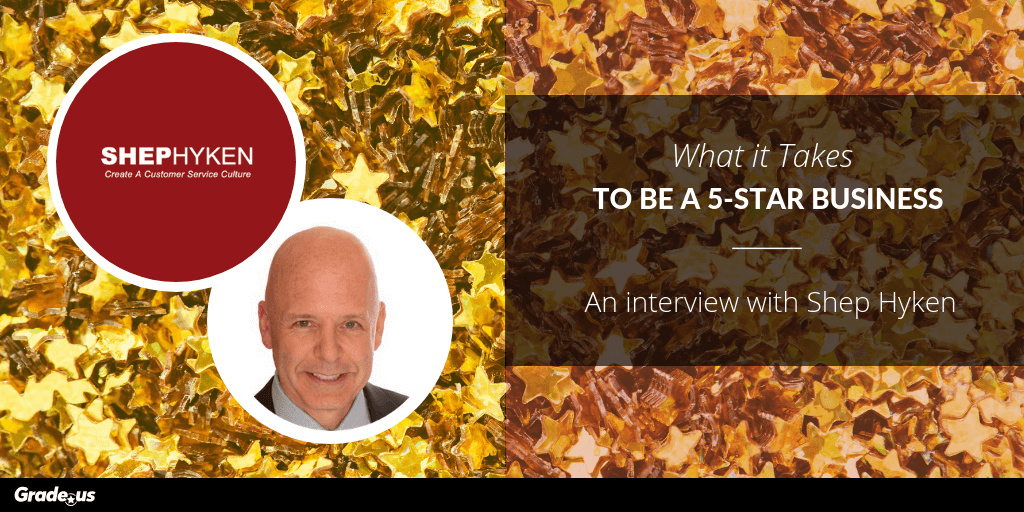Getting 5-star reviews is crucial if you want to stay in business, but you can't get 5-star reviews without delivering 5-star service. There truly isn't a trick, software package, or shortcut in existence which can help you sidestep this fundamental reality.
When it comes to teaching businesses how to do just that you'd be hard pressed to find a more impressive expert than customer service and experience expert Shep Hyken.
This bestselling author (The Convenience Revolution is his newest publication) and speaker teaches companies to build a top-to-bottom culture of customer service, and to look for creative solutions which can help them stand out from the competition.
Shep's a busy guy, but graciously sat down with me long enough to complete this interview on the competitive advantage of delivering a top-notch customer experience, and what it takes to seize it.
Here's the transcript of our old school phone conversation, lightly edited for easier reading.
Carmen: Why do you think customer experience has become such a competitive advantage?
Shep: It's because it offers value your competitors might not offer.
If you are better than your competitors, it offers a value that customers are willing to pay for. They will even pay more for it! And given the opportunity to do business with different companies, the one that's better-than-average that offers the good service and makes it easy and convenient to work with, that's the company that will win.
Of course, I'm making an assumption the product is going to do what it's supposed to do, whatever they're selling.
Carmen: What industries are leading the way in customer service, and which industries have fallen behind?
Shep: As a generality, B2C seems to set the bar for what good customer service looks like.
Everything happening in the B2C world is applicable to B2B.
Customers have more choices. Most people are consumers. They bring the experience and expectation to any company they end up working with, whether it be B2B or B2C.
If you look at some of the retailers there are many who are just nailing it. Look at Amazon, Apple, LL Bean.
There's hotel chains like the Ritz-Carlton and The Four Seasons.
There's retail companies like Ace Hardware that win JD Powers year after year.
Automotive groups like Lexus and Audi doing very well in their ratings.
The industries that still struggle are the phone, internet, and cable-type industries. There's a reason for that. They're getting better, and some of them are pretty darn good, but the problem with that industry is when it breaks.
If you're watching the Super Bowl and your cable goes out? That's a product-related issue at that point.
Another area that's difficult sometimes is financial services. Many times they're tied down by compliance, and that makes it hard to offer the service experience they want to give. That may get in the way of a customer or client giving that business a good rating.
And if you want to consider it an industry, the government has a long way to go in pleasing its customers. Bureaucracy and a lack of desire to give mainstream, retail-levels of service get in the way of many agencies offering great service to their customers.
Carmen: What are the primary barriers a local business faces when it comes to providing a 5-star customer experience?
Shep: A large company doesn't have any advantages a local company doesn't.
I just wrote an article about how Apple for six years in a row has won a brand advocacy award. There were ten areas they were rated on. The three they excelled in were differentiation, engagement, and consistency. I don't think there's anything wrong with a company, big or small, that can keep them from implementing those three ideas.
You've gotta engage the customers the way they like to be engaged. Social media. Direct interaction. There's many different ways. You've got to communicate:
"Why should someone do business with me instead of someone else?"
You've got to know:
"If we do the same thing, it doesn't matter, big or small, why should someone do business with me?"
Consistency. Is the experience the customer's going to get going to be the same every time? Customers love consistency.
Carmen: Are there any other factors to being a 5-star business?
Shep: The crucial thing is you put your customer first. And when you talk about customer first you also think, "employee first." It's really a people-first thing.
What decisions are you making that are going to impact the customer? Put the customer in the center of your business.
For example, you're extending a product line. Customers want it, they asked for it, fine.
But what about this one? "We need to raise your price?" Will customers be happy? Probably not. Does that mean you shouldn't do it?
What happens if, by not raising the price, you can't provide them the level of customer support they're used to?
What happens if by not raising the price you can't afford to put the ingredients customers love in your food?
Sometimes you have to do things the customer likes, but at least you're considering what the ramifications might be if you do or if you don't.
Carmen: Can customers always tell if it's customer-first?
Shep: I think they can, but you should also be ready to explain.
Let's say you're getting ready to take a flight somewhere, and the flight gets cancelled. When a customer asks and you tell them the plane had bad brakes, that you didn't just decide to do this, that it was a safety issue? No customer is going to disagree with you cancelling a flight for that reason. Sure, it's an inconvenience, but it's all about safety.
But if you go to another gate agent and ask the same question those two gate agents had better have the same answer!
Carmen: Do you see that a lot? Different reps having different answers to questions like this?
Shep: Sure. A lot of reps give you the answer they think is right, not that they know is right.
It happens in every industry. They're not just trying to make the customer happy, they're saying something different because they believe it's the right answer.
Carmen: So, someone has to be in charge of communicating what the right answer is to all the reps?
Shep: Exactly.
Carmen: What's the very first thing a business should do to earn a positive reputation?
Shep: I would say take care of your employees the way you want your customers taken care of first.
Treat your people the way you want your customers treated. It models the behaviors you want to see and when that happens the customer will go out and deliver an experience that's as good, if not better.
Your employees have an awesome responsibility. At any given time one person will represent the entire brand. Whomever the customer is talking to at that moment can make or break that brand's reputation.
Focus on your people first, and that will permeate out towards the customers.
Carmen: Who should be in charge of online review management for an organization?
Shep: How big is the organization?
In a larger company you might have a Chief Customer Officer or Chief Customer Service Officer. That's great, and that person has responsibility. But what about a 4 to 5-person company?
Here's how I look at it. It's everybody's responsibility to provide support, or a great experience, be it an outside customer, or an internal customer dependent on another employee.
In a smaller company it's really everyone's job to take care of the outside customer. My friend Mark Sanborn, who is an author and business expert, really said it best,
"When it comes to customer service, you don't need a title to be the leader."
Carmen:You just put out a new book called The Convenience Revolution. What's one of the most valuable pieces of advice that a consultant, agency, or small business owner would find in your book, and how does it apply to online review management?
Shep: Do anything you can do to reduce friction for the customer or make it easier to do business with you.
The company that's easiest to do business with has an incredible advantage over the competition. Look at what Uber did to the taxi cab industry. Look what Amazon did to the retail industry.
But how about my local car dealership that chooses to deliver a car to the customer whenever the customer needs service?
They drop off a new car, bring the customer's car back to the shop, and then bring it back and collect the loaner when they're finished. Makes it easy for the customer. The sale's rep's exact words when I bought the car was,
"The next time you come back to this dealership will be to buy a new car, not to get an oil change."
I'm now getting ready to buy my third one from that same dealership. And I'd worked with a different dealership for 22 years [before switching].
My dealership also offered that same brand. I told the salesperson [at the new dealership] they were too far away for me to buy the car. But he wrote up a deal. I went to the old dealership. They could match the price but not the service.
I've been doing business with them [the new dealership] ever since.
Carmen: What's one change you predict for the future of how businesses will approach customer experience?
Shep: The big changes are happening right now.
With the customer expecting more than ever before and learning from rockstar companies out there teaching us what good customer service is, more and more companies are going to recognize the value and start to deliver a great service experience.
The big change that will impact the company competitively is to add that element of convenience.
Having a great product, a great service, and a convenient experience is a triple threat. There are a lot of tools I could talk about to make that happen, like big data, etc., but conceptually it's these three things.
Carmen: Excellent! Thanks so much for your time today.
Shep: You're welcome.
About the Author
Raney C. Hudson
Raney C. Hudson is an independent content consultant with a 10+ year track record in the digital marketing industry.










